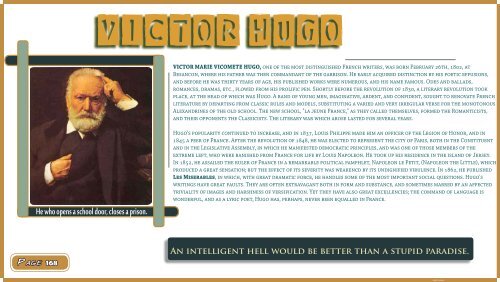You also want an ePaper? Increase the reach of your titles
YUMPU automatically turns print PDFs into web optimized ePapers that Google loves.
Victor Hugo<br />
VICTOR MARIE VICOMETE HUGO, one of the most distinguished French writers, was born February 26th, 1802, at<br />
Besancon, where his father was then commandant of the garrison. He early acquired distinction by his poetic effusions,<br />
and before he was thirty years of age, his published works were numerous, and his name famous. Odes and ballads,<br />
romances, dramas, etc., flowed from his prolific pen. Shortly before the revolution of 1830, a literary revolution took<br />
place, at the head of which was Hugo. A band of young men, imaginative, ardent, and confident, sought to renovate French<br />
literature by departing from classic rules and models, substituting a varied and very irregular verse for the monotonous<br />
Alexandrines of the old school. The new school, "la jeune France," as they called themselves, formed the Romanticists,<br />
and their opponents the Classicists. The literary war which arose lasted for several years.<br />
He who opens a school door, closes a prison.<br />
Hugo's popularity continued to increase, and in 1837, Louis Philippe made him an officer of the Legion of Honor, and in<br />
1845 a peer of France. After the revolution of 1848, he was elected to represent the city of Paris, both in the Constituent<br />
and in the Legislative Assembly, in which he manifested democratic principles, and was one of those members of the<br />
extreme left, who were banished from France for life by Louis Napoleon. He took up his residence in the island of Jersey.<br />
In 1852, he assailed the ruler of France in a remarkable political pamphlet, Napoleon le Petit, (Napoleon the Little), which<br />
produced a great sensation; but the effect of its severity was weakencd by its undignified virulence. In 1862, he published<br />
Les Miserables, in which, with great dramatic force, he handles some of the most important social questions. Hugo's<br />
writings have great faults. They are often extravagant both in form and substance, and sometimes marred by an affected<br />
triviality of images and harshness of versification. Yet they have also great excellencies; the command of language is<br />
wonderful, and as a lyric poet, Hugo has, perhaps, never been equalled in France.<br />
Page 168<br />
An intelligent hell would be better than a stupid paradise.<br />
Abhi Sharma


